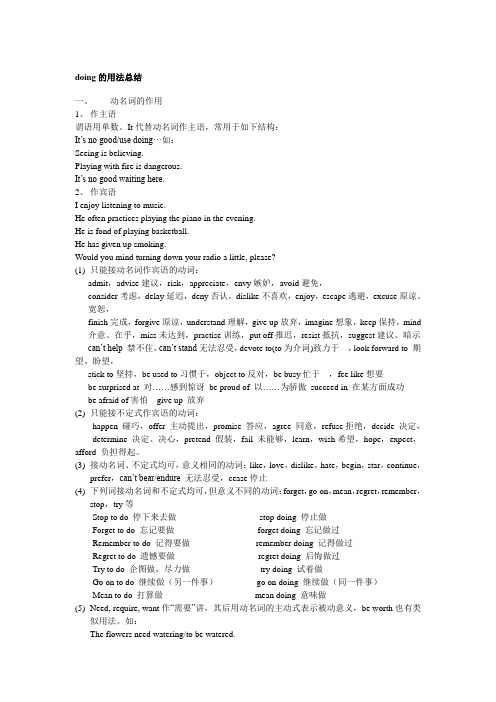doing的用法
- 格式:doc
- 大小:31.00 KB
- 文档页数:2

to do和doing的用法1、to do【释义】to do要做某事【短语】1What to do做什么;做些什么;怎么办;该做什么2decide to do sth决定做某事;决定去做某事;决定干某事;决定3want to do sth想要做某事;想要作某事;想要去做某事4intend to do想要做;打算去做;想要干;念要做5How to do怎么做;如何做;怎样做;指示做法6used to do sth过去常做某事;过去经常做某事7hope to do sth希望做某事;希望去做某事;希望干某事;但愿做没事8aim to do指望做某事;指看干某事;指看做某事;指望做没事9try to do sth尽力做某事;试着做某事;尽量做某事【例句】1I've got stacks of work to do.我有一大堆活儿要做。
2We rarely agree on what to do.我们很少在要做的事情上看法一致。
3I've got masses of work to do.我有一大堆的工作要做。
4Could you teach me to do that?你能教我干那活儿吗?5I've got far too much to do.我要做的事情太多了。
2、doing【释义】doingv.做;干(do的ing形式)n.活动;所作所为【短语】1learning by doing做中学;从做中学;干中学;在做中学2be worth doing值得做什么;值得做;值得;值得做某事3Doing Business做生意;营商环境报告;全球营商环境报告4be busy doing sth忙于做某事;忙于;忙于干某事;忙于做5finish doing sth完成做某事;完成某事;做完某事;结束做某事6go on doing sth继续做某事;继续干某事;继续做一直在做的事7mind doing sth介意做某事;介意作某事;考虑做;介怀做没事8practice doing sth练习做某事;练习作某事;练习干某事;练习做9mean doing意味着;意思是做某事;意思是;意味着做了某事【例句】1What're you doing tonight,babe?你今晚做什么,宝贝儿?2What's Tom doing these days?汤姆最近在干什么?3She's doing a terrific job.她活儿干得真棒。

Do/To do/Doing 的用法1.+ to do=+ doing:开始做某事begin to do/doing =start to do / doing 不喜欢dislike to do / doing 憎恨做某事hate to do/ doing喜欢做某事like / love to do / doing2.+ to do≠+ doing:忘记去做某事forget to do忘记已经做过某事forget doing记住去做某事(未做)remember to do记得已经做过某事remember doing 继续另一件事go on to do继续做原来的事go on doing 停下来去做某事stop to do 停止做某事stop doing 努力做某事try to do试着做某事try doing悔恨没做某事regret to do 后悔已做某事regret doing3.+ do帮助做某事help (to) do宁愿(不)做某事would rather (not) do最好(不)做某事had better (not) do4.+ doing:完成做某事finish doing喜欢做某事enjoy doing一直做某事keep doing练习做某事practise doing考虑做某事consider doing坚持做某事insist on / upon doing避免做某事avoid doing建议做某事suggest doing错过做某事miss doing想象做某事imagine doing介意做某事mind doing忍不住做某事can’t help doing坚持做某事keep on/ carry on doing成功做某事succeed/ be successful in doing 忙于做某事be busy (in) doing…怎么样? What /How about doing?对做某事感兴趣be interested in doing 因某事谢谢某人thank you for doing(非常)值得被…be (well) worth doing因为…because of doing而不是instead of doing(没)有做某事without/ with doing通过做某事by doing sth担心做某事worry about doing害怕做某事be afraid of doing放弃做某事give up doing做某事有麻烦have trouble / problems /difficulty (in) doing做某事开心have fun/ a good time/enjoy oneself (in) doing浪费时间做某事lose/waste time (in) doing sth 将某人的精力投入到…put one’s effort into doing 某人花费时/钱做某事sb spend +时间/钱(in) doing梦想做某事dream of/about doing5.+to do :选择做某事choose to do拒绝做某事refuse to do需要做某事need to do=require to do迫不及待做某事can’t wait to do准备做某事prepare to do=be ready to do 计划做某事plan to do决定做某事decide to do = make a decision to do = make up one’s mind(s) to do学习learn to do继续做某事continue to do付得起做某事afford to do 似乎做某事seem to do过去常常做某事used to do敢做某事dare to do梦见做某事dream to do碰巧做某事happen to do想做某事would like to do = want to do 别无选择做某事have no choice but to do 同意做某事agree to do希望做某事hope to do希望做某事wish to do不得不做某事have to do做某事失败fail to do答应做某事promise to do逐步做某事get to do更喜欢做某事prefer to do设法做某事manage to do应该做某事ought to do主动做某事offer to do尽某人最大努力做某事try/ do one’s best to do 采取措施做某事take action(s)/steps to do 等着轮到某人做某事wait for one’s turn to do轮流做某事take one’s turn to do有机会做某事have a chance to do没有时间做某事have no time to do与…比起来宁愿做某事prefer to do rather than do =would rather do than do足够…做某事enough+n.+ to do ,adj./adv.+enough+ to do为了… to do = in order to do= so as to do=for doing6.to doing :盼望做某事look forward to doing 习惯于做某事be used to doing 致力于做某事devote …to doing 与…比起来宁愿做某事prefer doing to doing 对…做出贡献make contribution(s) to doing 导致lead to donig7. sb to do :命令某人做某事order sb to do答应某人做某事promise sb to do邀请某人做某事invite sb to do警告某人(不)做某事warn sb (not) to do请求某人(不)做某事ask sb (not ) to do吩咐某人(不)做某事tell sb (not) to do想要某人(不)做某事would like sb(not) to do 需要某人做某事need /require sb (not) to do 鼓励某人做某事encourage sb to do使用某人做某事use sth to do教某人做某事teach sb to do 导致某人做某事cause sb to do训练某人做某事train sb to do建议某人做某事advise sb to do允许某人做某事allow sb to do希望某人做某事wish sb to do让某人做木事get sb to do提醒某人做某事remind sb to do拒绝某人做某事refuse sb to do迫使某人做某事force sb to do (agree sb to do是错的,hope sb to do 是错的)8.sb doing:使某人一直做某事keep sb doing sth 介意某人做某事mind sb/ sb’s doing 阻止某人做某事prevent /stop sb (from )doing = keep sb from doing 发现某人正在做某事find sb doing9.sb do/doing看见某人做某事see sb do/ doing 观看某人做某事watch sb do/ doing 听见某人做某事hear sb do/ doing 注意某人做某事notice sb do/ doing(句中有表示时点的词用doing, 有表示频度和感情的词用do)10.sb do:使某人做某事make sb do 让某人做某事let/have sb do帮助某人做某事help sb do = help sb to do11.关于to do/doing/do的句型(1)做某事花费某人…It takes /took+sb+ 时间+ to do (2)做某事对某人而言是…的It’s + adj. for sb/ of sb to do (3)做某事对某人而言是一个遗憾It’s a pity for sb to do(4)是某人第一次做某事It’s one’s first time to do(5)到了(某人)做某事的时候了。

doing的四种用法1)表示进行中的动作:"Doing"作为动词的进行时形式,表示目前正在进行的动作。
例如:"He is doing his homework." (他正在做作业。
) 这句话中的"doing"指的是"do"这个动作正在进行中。
2)表示经常性的或习惯性的动作:"Doing"还可以表示常态或习惯性的动作。
例如:"She is always doing her best in everything she does." (她总是在做任何事情时都尽最大努力。
) 这句话中的"doing"表示她习惯性地对任何事情都全力以赴。
3)表示做其中一种活动或职业:"Doing"也可以指一个人正在从事或从事其中一种活动或职业。
例如:"What is he doing now?" (他现在在干什么?) 这句话中的"doing"表示他当前正在从事项活动。
4)表示替代一些动词:在一些情况下,"doing"还可以用来替代一些动词的名词形式,以强调正在进行的动作。
例如:"I love swimming, but today I'm tootired to do any exercise." (我喜欢游泳,但今天我太累了,没力气做运动。
) 这句话中的"do any exercise"中的"do"之所以用"doing"替代,是因为它代指的是运动这个动作。
总之,"doing"作为动词的进行时形式,可以表示进行中的动作、经常性的习惯动作、正在从事的活动或职业,并且可以替代一些动词的名词形式以强调正在进行的动作。


Doing非doing,用法不一样Doing是非谓语动词中的一种,但是在英语中由于用法不同有两个说法,一个是动名词,另一个是现在分词,该语法即是学习难点,又是高考重要考点,而学生还容易混淆,为此笔者做了一些总结,希望有助于“doing”一词用法的学习一、动名词动名词的形式及特性:动名词的形式是由动词原形+ing 构成,动名词有时态和语态的变化,兼有动词和名词的特征,因而在句中可以作主语、表语、定语、动词的宾语、介词的宾语等。
1.doing的一般式是doing,表示动作与谓语动词同时发生或在其后发生,或表示一般情况。
Eg. Learning is important to modern lifeIt’s a wonder meeting you hereI am thinking of getting a new dictionary2. doing的完成式为having done,动名词的完成式所表示的动作在谓语动词动作之前发生,he didn’t mention having failed the exam.He denied having done anything illegal.但是要注意有些明确表示时间的动词和介词after/on/upon/for之后,常用一般式代替完成式,表示动作发生在谓语动作之前。
After having (had)some practice,he decided to try again.After hearing(=having heard)that good news,she couldn’t help laughing3. doing 的被动语态为being done:当动名词的逻辑主语是行为的承受者时,用被动语态eg. This question is far from being settledshe is proud of being admitted into the university.Being lost in the forest is a terrible thing4. 特殊情况必须用动名词:1)动名词做宾语:有些动词或短语动词后常用动名词作宾语。

doing的用法总结一、动名词的作用1、作主语谓语用单数。
It代替动名词作主语,常用于如下结构:It’s no good/use doing···如:Seeing is believing.Playing with fire is dangerous.It’s no good waiting here.2、作宾语I enjoy listening to music.He often practices playing the piano in the evening.He is fond of playing basketball.He has given up smoking.Would you mind turning down your radio a little, please?(1)只能接动名词作宾语的动词:admit,advise建议,risk,appreciate,envy嫉妒,avoid避免,consider考虑,delay延迟,deny否认,dislike不喜欢,enjoy,escape逃避,excuse原谅、宽恕,finish完成,forgive原谅,understand理解,give up放弃,imagine想象,keep保持,mind 介意、在乎,miss未达到,practise训练,put off推迟,resist抵抗,suggest建议、暗示can’t help 禁不住,can’t stand无法忍受,devote to(to为介词)致力于···,look forward to 期望、盼望,stick to坚持,be used to习惯于,object to反对,be busy忙于···,fee like想要···be surprised at 对……感到惊讶be proud of 以……为骄傲succeed in 在某方面成功be afraid of害怕give up 放弃(2)只能接不定式作宾语的动词:happen 碰巧,offer 主动提出,promise 答应,agree 同意,refuse拒绝,decide 决定,determine 决定、决心,pretend 假装,fail 未能够,learn,wish希望,hope,expect,afford 负担得起。
只能是只能是只能是只能是doing sth1、enjoy doing sth[]享受做某事2、finish doings sth[]结束做某事3、practice doing sth[]练习做某事4、mind doing sth []介意某事5、be busy doing sth []忙于做某事6、have fun doing sth []很开心做某事7、have problems doing sth []有问题做某事8、have difficulties doing sth []有困难做某事9、have trouble doing sth[]有麻烦做某事10、spend some time doing sth []花时间做某事11、prefer doing sth to doing sth []更喜欢做某事12、be used to doing sth []习惯于做某事13、look forward to doing sth []盼望做某事14、be interested in doing sth []有兴趣做某事只能是只能是只能是只能是to do sth15、want to do sth []想要16、would like to do []愿意17、agree to do []同意18、refuse to do []拒绝19、decide to do []决定20、plan to do[]计划21、expect to do[]期望22、hope to do[]希望23、wish to do[]但愿to do doing 均可均可均可均可,,,,但意思不一样但意思不一样但意思不一样但意思不一样24、like to do sth[]喜欢马上去做某事25、like doing sth []平常喜欢做某事26、prefer to do sth []更喜欢马上去做某事27、prefer doing sth []平常更喜欢做某事28、hate to do []不喜欢马上去做某事29、hate doing sth[]平常不喜欢做某事30、try to do sth []尽力去做某事31、try doing sth []试着去做某事32、remember to do sth []记得去做某事33、remember doing sth []记得做过某事34、forget to do sth []忘记去做某事35、forget doing sth []忘记做过某事36、stop to do sth []停下来去做某事37、stop doing sth []停下正做的事V+sb+to do sth结构结构结构结构38、would like sb to do sth[]愿意某人去做某事39、like sb to do sth[]喜欢某人去做某事40、want sb to do sth []想要某人去做某事41、wish sb to do sth []但愿某人去做某事42、expect sb to do sth []期盼某人去做某事43、prefer sb to do sth []更喜欢某人去做某事44、allow sb to do sth []同意某人去做某事45、encourage sb to do sth []鼓励某人去做某事46、advise sb to do sth []建议某人去做某事47、ask sb to do sth []要求某人去做某事48、tell sb to do sth []告诉某人去做某事49、get sb to do sth[]使得某人去做某事50、invite sb to do sth []邀请某人去做某事特殊结构特殊结构特殊结构特殊结构51、make sb do sth[]让某人去做某事52、let sb do sth[]让某人去做某事53、have sb do sth[]让某人去做某事54、help sb to do sth[]帮助某人去做某事55、help sb do sth[]帮助某人去做某事其他结构其他结构其他结构其他结构56、stop sb from doing sth[]阻止某人去做某事57、stop sb doing sth[]阻止某人去做某事58、keep sb doing sth[]让某人一直做某事59、keep sb from doing sth[]阻止某人去做某事60、get sth done[]让某事被做61、have it repaired[]让这个东东被修理62、have my ears pierced[]让我的耳朵穿孔63、have my hair cut[]让我的头发被剪64、health healthy healthily[]健康n 健康的adj 健康地adv 65、weight himself[]自已量体重66、daily walk[]每天的散步67、monthly meeting[]每月的会议68、clever bright wise[]聪明的adj 聪胆伶俐的adj 见多识广的adj 69、must be[]一定是70、at least[]至少n 71、cigarette[]香烟n 72、hamburger[]汉堡n 73、chocolate[]巧克力n 74、wonder[]想知道v 75、ask for permission[]请求同意76、surprisingly[]令人意外地adv 77、the best route[]最好的路线78、as the days grow shorter and colder[]随着天气越变越冷79、normally casually actually[]正常地adv 随意地adv 事实上adv 80、crowded awful[]拥挤的adj 糟糕的adj 81、urge[]敦促v 82、since[]因为conj 自从conj 83、make it worse[]使之更差84、treat []治疗v 对待v 85、heal[]医治n。
doing作状语1.用法:动词ing作状语时,可以表示时间、原因、结果、条件、方式或伴随动作。
通常可转化成与之相对应的状语从句。
2.分类:(1)作时间状语e.g. Walking in the park, she saw an old friend.= When/While (she was) walking in the park, she saw an old friend.Having finished the work, he went to see his teacher.= After he had finished the work, he went to see his teacher.(2)作原因状语e.g. Being too young, he couldn't join the army.= As he was too young, he couldn't join the army.Not knowing how to get there, I had to ask the way.= As I did not know how to get there, I had to ask the way.(3)作条件状语e.g. Working hard, you'll make great progress.= If you work hard, you'll make great progress.(4)作结果状语e.g. His parents died, leaving him an orphan.= His parents died and left him an orphan.The snow lasted a week, resulting in a serious traffic confusion in the whole area.=The snow lasted a week, and resulted in a serious trafficconfusion in the whole area.注意:动词ing形式与不定式均可作结果状语,区别是:动词ing 形式表示顺其自然、意料之中的结果,而不定式则表示不愿看到的、出人意料的结果。
非谓语动词三剑客之一——doing第一部分:Read the following sentences and find out the function.1. The falling leaves in the wind look like beautiful butterflies around the flowers.2. The girl sending milk every morning last month is from the country.3. I caught a thief stealing a car so I called the policeman.4. Don’t have the students studying all day.Link to the NMET:1. Don’t leave the water ______ while you brush your teeth.A. runB. runningC. being runD. to run2. I found the game excited.3. --- Did you enjoy yourself at the party?--- Yes, I’ve never been to ______ one before.A. a more excitedB. the most excitedC. a more excitingD. the most excitingPractice:I. Fill the blanks using proper forms.1. I saw the children ______ (whisper) to each other when you turned around.2. I counted the people ______ (enter) the cinema, and there were more than 150.3. I almost fell asleep when I watched the ______ (bore) TV play.4. The man with sunglasses ______ (stand) next to the car is a professor.5. You should try hard to improve your ______ (write) ability.6. I found a note ______ (read): I will come back tomorrow.II. Multiple Choices.7. The wild flowers looked like a soft orange blanket ______ the desert.A. coveringB. coveredC. coverD. to cover8. The flowers ______ sweet in the garden attract the visitors to the beauty of nature.A. to smellB. smellingC. smeltD. to be smelt第二部分:Read the following sentences and find out the function.1. Learning English is a hard job.2. It is no use crying over spilt milk!3. Li Li is considering changing her job at present.4. We had no difficulty (in) finding the white house.5. The blackboard needs cleaning now. (= The blackboard needs to be cleaned.)6. The news sounds exciting that the Chinese athletes have won morn than 100 gold medals in the Asian Games in Doha.7. Our job is playing all kinds of music.Link to the NMET:I. Error correcting1. Having fun with their friends make them happy.2. I am looking forward to see all of you again in the near future!3. I knocked at the door and was delighting when a pleasant old man opened the door and listened to my story carefully.II. Multiple choices.1. I can’t stand ______ with Jane in the same office. She just refuses ______ talking while she works.A. working; stoppingB. to work; stoppingC. working; to stopD. to work; to stop2. It is difficult to imagine his ______ the decision without any consideration.A. acceptB. acceptingC. to acceptD. accepted3. Having been ill in bed for nearly a month, he had a hard time ______ the exam.A. passB. to passC. passedD. passing4. Isn’t it time you got down to ______ the papers?A. markB. be markedC. being markedD. marking5. Born in the big city, you don’t know the difficulty the farmers have ______ the crops.A. growB. growingC. to growD. grown6. It is no ______ arguing with Bill because he will never change his mind.A. useB. helpC. timeD. way第三部分:Read the following sentences and find out the function.1. Don’t sit there doing nothing. Come and help me with this table.2. Oil prices have risen by 32 percent since the start of the year, reaching a record US $57 on April 4.3. Hearing the news, they all jumped with joy.4. Being a student, he spent most of his time in studying.5. Seeing from the top of the mountain, you will get a wonderful view.Link to the NMET:1. Then, I put my book under my desk, opening it and started looking for the answer.2. While watching television, ______.A. the doorbell rangB. the doorbell ringsC. we heard the doorbell ringD. we heard the doorbell ringsPractice:I. Error correcting1. Shake her head, she said. “It isn’t a good time to do that, dear.”2. At weekends, we would play basketball, swimming in the pool or go for a picnic.3. Judging from his expression, he is in a bad mood.4. Not got an answer, I decided to write him another letter.II. Multiple choices.5. “We can’t go out in this weather,” said Bob, ______ out of the window.A. lookingB. to lookingC. lookedD. having looked6. ______ more about university courses, call 7463789.A. To find outB. Finding outC. Find outD. Having found out7. ______ in the queue for half an hour, Tom suddenly realized that he had left his wallet at home.A. To waitB. Have waitedC. Having waitedD. To have waited8. ______, the more expensive the camera, the better its quality.A. General speakingB. Speaking generalC. Generally speakingD. Speaking generally9. His bike ran into the wall, ______ his arm.A. injuringB. injuredC. to injureD. having injured10. ______ a reply, he wrote again to ask about what was going on.A. Not receivingB. Receiving notC. Not having receivedD. Having not received。